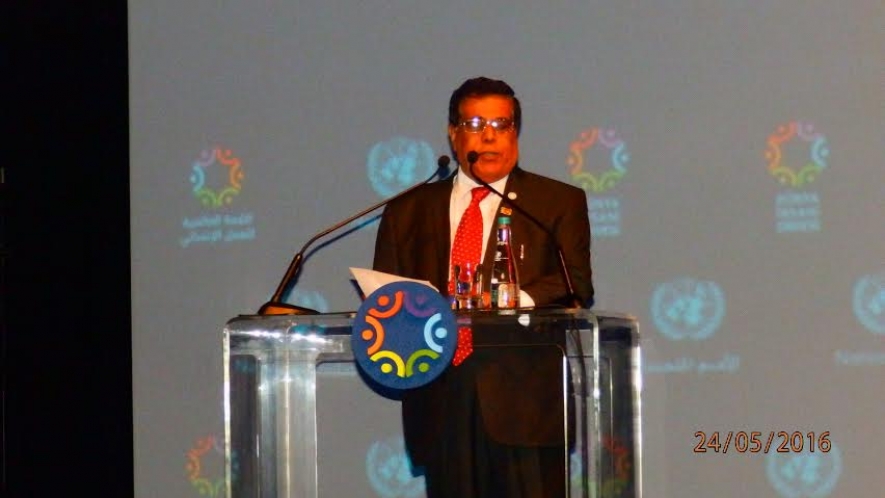Minister stated that the increased occurrence of disasters in the regions not only threatens to roll back hard earned development gains, but also the achievement of the development goals. In respect to the core responsibilities related to natural disasters and climate change, it is the prime responsibility of the governments as humanitarian actors to serve the vulnerable members of the society, especially, women, children and elderly, who are in need of assistance. In thıs regard, Sri Lanka is committed to reaching out these vulnerable group members in tımes of crises.
Minister De Silva, participating at the WHS representing President Maithripala Sirisena, stated that the UN Secretary General Ban Ki Moon’s “Agenda for Humanity” provides a strategic framework to prevent the humanitarian crisis and mitigate the effects. However, he stressed that action to implement the core responsibilities articulated in the WHS, should be aligned with the UN Development agenda, especially the core principles and objectives that countries have already committed to Addis Ababa Action for Financing for Development, 2030 Agenda for Sustainable Development and Paris Conference on Climate Change.
In his speech, the Minister also highlighted the success achieved by Sri Lanka in overcoming the humanitarian situation caused by Tsunami and the effects of an armed conflict. He credited this achievement to the collective support received from all stakeholders. However, he also emphasised on the changes in our approach that is essential to act early on identified risks.
Minister De Silva also participated at the Special Session on Global Health held at the WHS as a special invitee. Speaking at this session, he stated that frequency and the scale of humanitarian crises that have been occurring in the world in the recent years, have caught national healthcare sectors under-prepared and under-resourced to respond to them effectively.
While acknowledging the limitations of national capacities and capabilities in addressing health issues in the face humanitarian crises, the Minister stressed on the development of national, regional and global preparedness through policy actions if countries are to respond swiftly and effectively to health challenges in times of crisis. In this respect, he suggested that efforts to address crisis-related health issues must be done proactively by establishing sustainable programs aimed at strengthening of health systems in order to achieve crisis-preparedness and resilience.
The Minister further detailed that at the national level, this would require assisting national healthcare systems to be better equipped to monitor, prevent and prepare for health crises, by increasing their resources and building capacities. At the international level, urgent measures are required to strengthen international coordination and cooperation with regard to information and knowledge sharing, providing technical assistance, and putting in place solid financing arrangements to assist national health systems and to promote medical research.
In addition to representing Sri Lanka at the World Humanitarian Summit , Minister de Silva also tabled a statement on behalf of Group of 15 (G15) which Sri Lanka currently holds the chairmanship.
The First World Humanitarian Summit was an initiative first proposed by UN Secretary General, Ban Ki-Moon, in January 2012 to ensure countries , organisations and relief workers come together to address global humanitarian crisis and was based on five commitments given below;
1.Global leadership to prevent and end conflict
2. Uphold the norms that safeguard the humanity
3.Leave no one behind
4.Change people’s lives: from delivering aid to ending need
5. Invest in humanity
Leaders and delegates from around 175 countries attended the two day Summit. According to the organizers, more than 3500 participants including government officials, members of the business community, representatives of INOs and NGOs, Civil Society organisations, media and representatives of the affected countries and communities have attended and made the Humanitarian Summit a platform to voice their concerns, share their experiences and to commit towards a better mechanism to address the humanitarian issues.




















